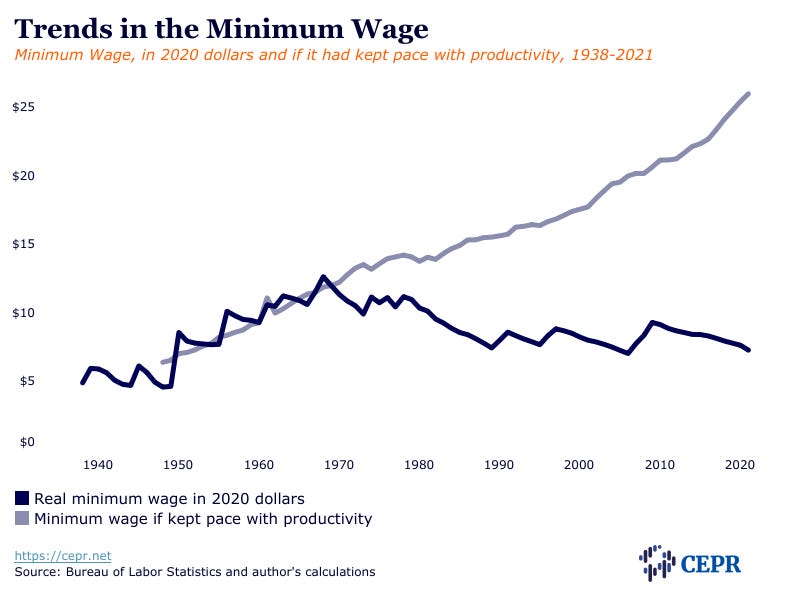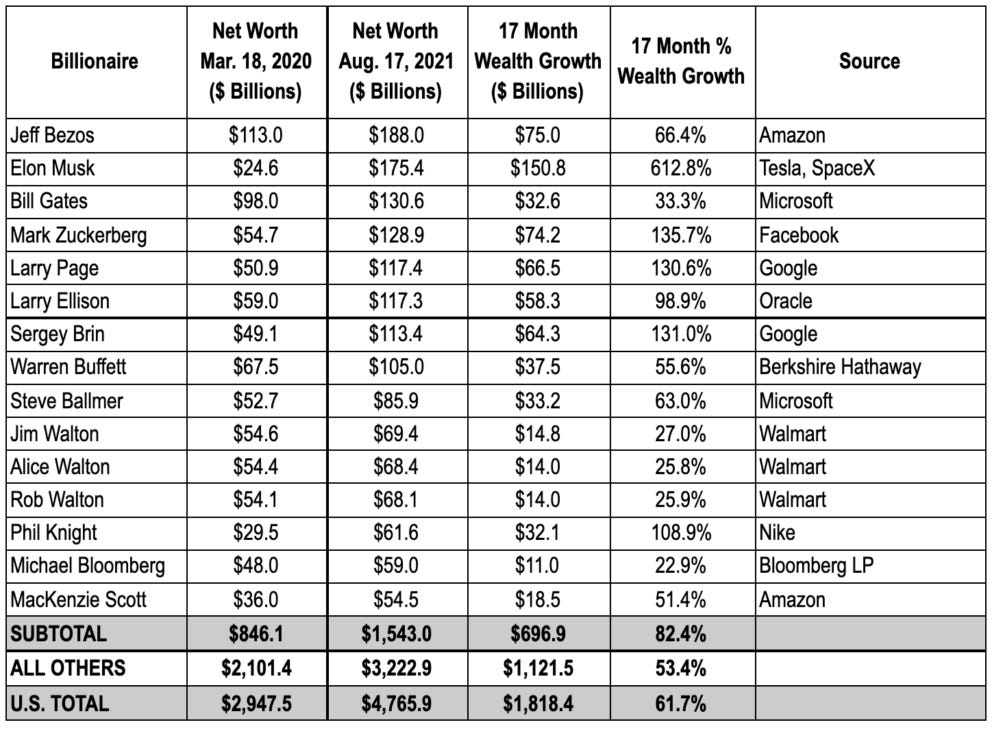LONG TAKE
Let’s not be fooled by the way in which the media and the elites are framing the debate over infrastructure plans, stimulus and the current policies of the Federal Reserve Board. Don’t get trapped into the set-up of the struggle using a political spectrum pitting “moderates” versus “liberals”.
A better way of understanding this is: factions who want to keep the same economic system in place that has conducted concerted class warfare for at least half a century VERSUS those who want to put an end to a deep system of exploitation and robbery. In a sec, I will illustrate this in one graph—a graph that will summarize half a century of bad economics and, to boot, help you counter the fear-mongering about inflation.
But, first, the various blocs—and you can slice these up in a variety of ways—are not what you’d necessarily draw up if you listen to the chatter, and there is some overlap (think of your high school Venn diagram lesson). Here is a very broad picture:
The Manchinites—It’s a tangled lot. I use the term “Manchinites” in a broad sense to scoop together various people in Congress, their corporate donors, media talking heads and general elites who don’t know shit about economics other than (a) what they’ve absorbed from shallow bits of talking points glorifying the “free market” or “deregulation” or “tax cuts” or something embedded in their cranial recesses from some mainstream Economics 101 class they took in college which teaches, for example, that “free trade” is always a good thing and/or (b) they understand some economic realities, especially the grossly unfair, rigged tax system, but they just don’t care because the system is working just fine for each person individually in this group.
Manchin is simply a good example to use as a brand. He’s not very bright, if you spend a few minutes listening to his thought process. He got a basic small business administration degree and, then, went on to found a coal brokerage firm—not much of a heavy lift in West Virginia. By West Virginia standards, he lives the life of a rich man in a mansion on a gated waterfront plot. He’s awash in corporate donor money, especially from Big Oil interests.
These folks are not “moderates” or “conservatives” as much as they are “corpsystemites”: they worship the “free market” system and think everything that is good flows from the “ingenuity” of CEOs and small businesses and competition, all wrapped up in the daily extolling of American Exceptionalism.
I’ll come back to Manchin when I take up the graph below.
Share
The Biden liberals—no doubt about it, Biden is trying to advance much broader domestic spending than anyone thought he would take on, in no small part based on ideas pushed by some strong progressive folks who landed inside the Administration. I don’t share my progressive friends view that the “correct” progressive position is to dump automatically on things that don’t go far enough (say, because health care investments fall short of Medicare For All). That’s a given right now because of the simple fact that progressive don’t run the show and don’t have the votes.
It’s not for this post to dive too deeply into the question of whether the proposed bills are a shift in who Biden is or much more are a reflection of a moment that is shaping the plans—in other words, that the pandemic-driven economic collapse, which shined a light on how bad a shape the country is in and the long-term ignoring of peoples’ needs that the government should be all in on, is the real driving force behind what Democrats are advancing, and that once the pandemic recedes, the Biden liberals will revert to form.
But, let’s be 100 percent clear—the Biden liberal faction is not interested in ending the basic outlines of the system, and this is something that is shared with the Manchinites, not to mention the whack-a-doodles in the Republican Party. You don’t need to look further than the unquestioned embrace by the president, as I wrote recently, of the “public-private partnership” scam: when you think it’s a good idea to dump public money on a vast array of projects that will end up lining the pockets of already profitable private companies or benefit outrageously companies that are bilking the people (example: investing billions into expanding broadband, which should be free to all, but will simply strengthen the current monopolies of big media companies) well, it pretty much paints the picture of your view of how the economy should work.
The Progressives: or as the shallow media talking heads like to say, using a catch-all phrase, “the left”. But, this is a varied group—a tangled story for another day. In brief, “progressive” was a term embraced back in the late 1980s or so as a way for socialists to stand for something specific but not be red-baited in an era when, especially in the labor movement, you could still lose your job if you were considered too “left”. Not everyone who calls themselves a “progressive” understands basic economics (I could name names but just listen yourself to some of the voices getting the most visibility), and they don’t all fall into a neat group of people advocating for upending the entire economic system that has hurt so many.
In some ways, the label “progressive” has almost lost meaning because virtually anyone can adopt the moniker—including frauds who use the label to promote themselves politically. Hell, Andrew Cuomo referred to himself as a “progressive”, at the same time he was handing out huge tax cuts for corporations who, in turn, rewarded him with massive campaign donations. Robert Reich calls himself a “progressive” because it conveniently paves the way for him, Zelig-like, to appeal to new audiences who don’t recall his (a) pimping for NAFTA during the Clinton Administration (b) promoting the elitist, laughable theory that the future rested with everyone who would be a “symbolic analyst” and (c) his shouting loudly, repeatedly, the racist trope that America’s workers are the best in the world. You can partly use the membership of the Congressional Progressive Caucus as a barometer for the muddling of the term—you can find among the caucus members folks like Rashida Tlaib and Barbara Lee, who are vocal advocates for progressive economics, sitting along side Earl Blumenuaer who was a vocal advocate for the odious anti-worker so-called “free trade” deal the Trans Pacific Partnership (TPP).
Alright, after building up the drama and having you on the edge of your chair…to the graph which, to my mind, explains *everything* you need to know about economics and whhat faction someone rightly belongs to: this is a picture of class warfare over close to a century, the robbery engaged in by corporations and the collaboration of elected politicians and their enablers.
In plain language: the federal minimum wage should be around $26-an-hour if it matched productivity—which is how the minimum wage tracked over three decades starting in 1938. This is not a new thought—it’s been pointed out for many years by others including by my friend Joel Rogers.
What do we learn from that graphic above?
First, the folks who are pushing the Fight for 15 are doing amazing work. But, it’s a sign of how deep a hole workers find themselves in, and the vast, deep, consistent stealing of workers’ labor, that $15-an-hour is the clarion call for a “fair wage” for minimum wage workers when that wage is not even close to what it should be.
Do the math: if you work 52 weeks a year at $15-per hour (which means no vacation, no time off), you take home a gross income of $31,200—which is just above the federal poverty line for a family of five; and that poverty measurement understates what it costs to get by in huge swaths of the country, especially urban areas.
Share
Second, keeping that first point in mind, you can know instantly where peoples’ heads are at if they argue against raising the federal minimum wage to $15-an-hour: they have no interest in ending poverty. Manchin is, again, a symbol of this mindset. He opposes the hike to $15-an-hour, demanding something “responsible and reasonable” to not “hurt” small business, which, he has said, is a minimum wage of $11-an-hour in West Virginia—a state that has the 6th highest poverty rate in the nation.
So, this one is easy: when you hear someone claim that $15-an-hour is TOO MUCH they (a) do not understand economics because virtually every credible study over the past 30-plus years has shown virtually no bad outcomes for businesses when minimum wages go up and, in fact, when people have more money to spend the traditional economic measurements show an uptick and (b) they are not allies of workers.
Third, grasping this in a holistic way, it is not by chance that the initial break between the minimum wage level and productivity—and the downward trajectory of the minimum wage—begins, most visibly, in the 1970s. That would be the time that politics would be gripped with the underpinnings of modern class war, embracing a host of such bad ideas that economists and economic historians in, say, 100 years are going to publish reams of books and studies overwhelmingly taking the view roughly, “What the fuck were these morons thinking?”:
Deregulation is lofty—the idea that government sucks, that the best economic plan leaves the entire landscape to free-market competition. That really bad idea took hold under the Carter Administration and never let up, and was “The era of big government is over” message of the Clinton-Gore campaign in 1992. It led to more death and illness in the workplace, among other lethal results, and put the planet on a fast-track to destruction because one obvious outcome of letting corporations run the show with minimal-to-zero restraints has been the steady poisoning of the earth.
Taxes are bad. Which, to one extent or another, makes it more obvious that the way in which the traditional “left-right” political spectrum is set-up is fairly meaningless because from loony Republicans to Manchinites to Biden liberals it’s hard to find a lot of difference among those folks in the 1980s, 1990s and early 2000s on tax cuts. Recall, the Reagan tax cuts (as would be true with Bush’s tax cuts) were passed with plenty of Democratic Party votes (look up “southern boll weevils”). And even the objectors to the most foolish reaches of tax-cutting (Read: Democrats) always caveated their view with “we aren’t against lower taxes for corporations and rich people, just at ‘more responsible’ levels”. And, presto, you have today’s reality of billionaires getting very rich under any Administration, just a bit richer with Republicans.
Unions are bad. Ronald Reagan’s decision to break the air-traffic controllers union in 1981 brought explicit union-busting and union “avoidance” into the mainstream, to the point now that it is a multi-billion business practiced by, among others, every major big corporate law firm in the country—including plenty who give political contributions to both major political parties.
Inflation is a curse… and…
Fourth, the “inflation is a curse” is worth pulling out on its own because it is bouncing around virtually every day in the discourse that will make a difference to millions of people who are trying to get a job or just claw back a bit from the depths of the most recent economc collapse. You’ve read this, right? The Manchinites screaming that the economy is “recovering” and more spending will only fan the fires of inflation.
JFC: inflation has not been an issue for decades. It has a hold on really dumbasses like Manchin because they believe—mistakenly—that the inflation of the late 70s and early 1980s is a danger always on the horizon.
Rubbish. The inflation back then was about one thing, and one thing only—oil. And, specifically, the oil embargo and a geo-political struggle between nation-state and corporate oil cartels. Nothing more. For lots of reasons worth writing about more in-depth, we will not see, in our lifetimes, that pay-check, eroding inflation.
And that distracts from the real threat to pay checks—corporate power, anti-unionism, unfair tax systems and, in fact, an ECONOMICALLY ERRONEOUS AND RUINOUS drive to cut back pouring money into a whole set of projects and ideas that people need (say, child care and paid family leave). No one under the age of 40 is thinking about inflation but most people under 40 *are* thinking about how to get a decent job, or have a pension, or get affordable health care or pay off mountains of financial debt.
Fifth, and thankfully, last point: this is a framework. We aren’t just fighting over how big the infrastructure bill should be. The entire exercise here above is to illustrate that you can understand virtually every dumb position you hear to today to underfund peoples’ need in the graph about the minimum wage: the entire system that is being defended by the Manchinites and many of the Biden liberals exists to exploit peoples’ labor for the profit of a few.
Share
SHORT TAKES
This isn’t a hard thought: kids should not live in poverty. Along with how society treats seniors, it’s a measure of morality of a country to look at how kids fare in a brutal economy that batters their parents.
It only takes a little bit to lift kids up—like an expanded child tax credit. Here’s what that policy did, via the Center on Poverty and Social Policy [emphasis added]:
COVID-related economic relief, including the expanded Child Tax Credit, kept 6 million children from poverty in July 2021; without COVID relief, the monthly child poverty rate would have been 8.1 percentage points (or 40.6 percent) higher.
• The monthly child poverty rate fell from 15.8 percent in June to 11.9 percent in July 2021, representing a decline of 3 million children living in poverty.
• This drop in child poverty is primarily due to the first payment of the expanded Child Tax Credit, which on its own kept approximately 3 million children from poverty in July; without it, the monthly child poverty rate would have been 4.1 percentage points (or 25.6 percent) higher.
Share
I’ve kept up on this for some time so an update for every subscriber who I know is just deeply worried about how the billionaire class has been faring during the pandemic. Not to worry! They all have made plenty of money over 17 months—collectively getting $1.8 trillion richer—and, whew, they can pay the rent.
Here you go, courtesy of Americans For Tax Fairness—
In words, for example: “That means the $1.8 trillion increase in American billionaire wealth over the last 17 months could pay the entire 10-year cost of making healthcare more affordable for 9 million people more than 10 times over.”[via subsidies under the Affordable Care Act—JT]
So, you can sleep soundly now.
Share Working Life Newsletter
Leave a comment
Share








